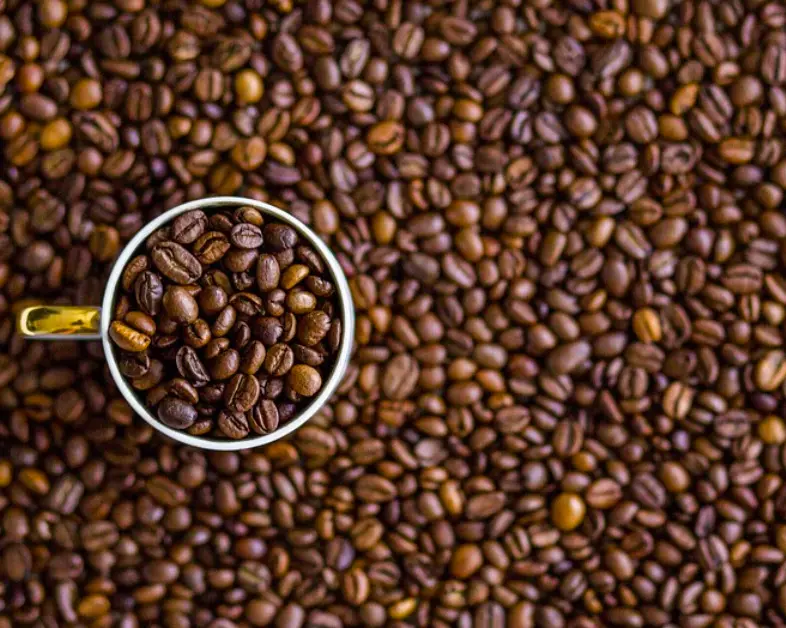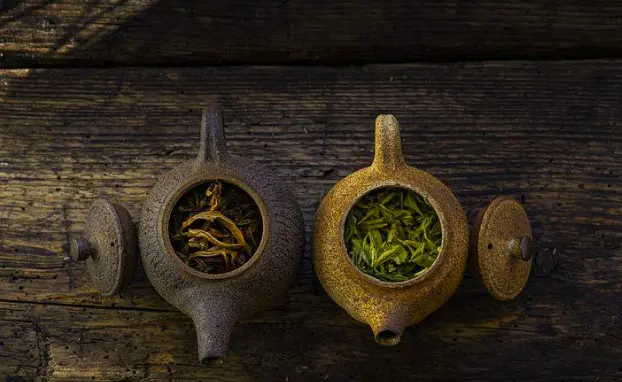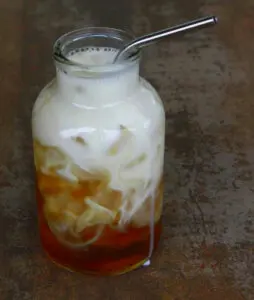
Introduction
Does Thai tea have caffeine, you wonder? Well, Thai tea is made from black tea, so yes, it contains caffeine. Normally, Thai tea is made by adding condensed milk and sugar to black tea. As such, since a normal cup of black tea contains approximately 20 mg of caffeine, it is accurate to conclude that is the same amount you would find in Thai tea.
Besides caffeine, Thai tea also serves fat and carbohydrates. It contains 2-22 g of fat and between 24-38 g of carbohydrates. Thai tea is naturally a very popular drink in Thailand, and people there call it “Cha-Yen”.
Depending on people’s different tastes, Thai tea can have different added flavors including cardamom, vanilla, tamarind, star anise, and orange blossom water.
What is Thai Tea?
Thai tea is a flavored sweet drink with a creamy taste and texture. It also has an amazing flavor, which varies considerably depending on the added spices and fragrance. You can easily make Thai tea by adding condensed milk and sugar to black tea.
The final taste mainly depends on the ingredients in the tea, and that varies considerably subject to individual preference.
If your brain is asking if thai tea has caffeine, the answer is yes. All teas, except herbal teas, contain caffeine. The caffeine quotient, however, differs from one tea to the next. Besides the type of tea, factors such as the brewing method and water temperature also influence the caffeine concentration across different teas.
When you consider an 8 Oz cup, the caffeine quotient of different teas is as listed below:
- Herbal: 0 mg
- White: 10-15 mg
- Green: 15-45 mg
- Oolong: 30-45 mg
- Assam/Black: 60-75 mg
- Matcha: 60-80 mg
From the above data, it is easy to draw that darker teas tend to have a higher caffeine concentration.
How much caffeine does Thai Milk Tea contain?
Iced Thai milk tea approximately contains 45-55 mg of caffeine per 8 oz cup. This figure can vary slightly depending on the recipe used. When compared to coffee, a similar size cup would contain 125-150g of caffeine.
As such, it is clear that the caffeine content in thai tea and black teas, in general, is approximately 3 times lower than that in coffee.
Let’s compare the caffeine content in thai tea to that of other caffeinated drinks.
- Coke from Coca-Cola Company: If you drink 12 Oz of coke you will have taken 34 mg of caffeine, which means that 8 Oz of the drink will give you 23 mg of caffeine. Clearly, the caffeine content is much lower in Coke than in Thai milk tea.
- Redbull: This energy drink is quite popular in the market and a favorite among many. A 250 ml can, which is equivalent to approximately 8.5 Oz contains 80 mg of caffeine. When you compare this to Thai tea, Rebdull has twice as much caffeine.
You will notice that, whether you drink coke, thai tea, or Redbull, you will experience zero side effects as a result of caffeine ingestion. As such, regardless of the caffeine content in thai tea, feel free to drink as many cups as is comfortable for you. Enjoy your Thai milk tea without worry.
How To Make Thai Tea At Home
Step 1: Purchasing and preparing your Thai tea
Normally, Cha TraMue packages their Thai tea a bit traditionally in a huge bag or box. Lately, however, they have introduced sachet packaging of the tea. These sachets are quite easy to use, and efficient, and make the entire process a lot easier. With the larger packaging of the product, you will need to purchase a tea filter bag if you don’t have one.
Cha TraMue recommends that you use 2g of the tea in a 200 ml cup of boiling water. To initiate the process, pour the tea mix into a filter bag, place the bag in a cup, and pour in your boiled water.
Allow the tea to simmer for a bit (about 3-5 minutes) before taking the filter bag out. For a richer, more fragrant tea, take an extra cup and run your tea through your filter bag several times while exchanging it from one cup to the other. That way you will have extracted most of the tea content from the tea mix before disposing of it.
Step 2: Fine tune your tea for aromatic taste
Your Thai tea is ready, but in this step, you can add ingredients that will customize the tea to your particular taste preference. If you have a sweet tooth, you can add sugar or honey to your Thai tea.
If you are looking to drink a flavored tea, this is where you add your lemon, lime, rosemary, or any flavor you want. Want to have your Thai tea iced, let it cool down and then add ice to it. This step allows you all the flexibility you need to create just the flavor you want for your Thai tea.
Step 3: Brew your Thai milk tea
This step is optional. However, if you want to make Thai milk tea, remember to purchase condensed and evaporated milk. Take the condensed milk and add it to your hot Thai tea and stir the mix until it is well blended.
You will know it is well blended when it gives you nice orange color. Once that’s done, allow your tea to cool down before adding your evaporated milk. This is the best part of the whole process and should give your tea a rich, creamy taste.
It is now time for you to sit down and enjoy your lovely cup of iced Thai milk tea.
What does Thai tea taste like?
Want to know what Thai tea tastes like? Well, it’s nothing complicated, in fact, you can easily make it in your own home and give it the taste you prefer. Basically, however, it is a sweet, creamy, and tasty drink that has a similar texture.
You can always expect a lovely flavor whenever you are taking your Thai tea; its natural fragrance is amazing.
If you have not had Thai tea before, it is made using rich black tea with a distinctive tannin taste. It also contains a very creamy dairy that has a similarly strong flavor. Thai tea has a heavy consistency, almost similar to that of milkshakes.
It is a sweet flavored tea that can be flavored according to individual preference. Whether you like a vanilla-tasting Thai tea or a spicy one, the choice is yours.
Ingredients & Nutrition Of Thai Tea
Wondering what Thai tea is made of? Well, very common ingredients that you probably know too well.
When you compare Thai tea to other black teas, you realize that it contains a higher calorie quotient mainly due to the addition of sweeteners and condensed milk. The basic Thai tea ingredients include water and tea leaves. In most cases, depending on individual preference, some people will add condensed milk, but this is not always the case. Other additional ingredients include syrup, spices, and even sugar. The ingredients vary significantly based on preference.
The nutritional value of Thai tea mainly depends on the brand used, as such it varies significantly as well. Normally, however, most black teas contain 2 calories in every 8oz cup, water for hydration, and highly beneficial antioxidants that positively contribute to your health.
In every 100g of condensed milk, you will gain 321 calories and 54g of sugar. Although condensed milk is great for giving us such minerals as Vitamin A, calcium, and others, it also contains high levels of fat and cholesterol.
As such adding milk and sugar to your Thai tea will mean increasing the calorie content in your cup. Black teas, including Thai tea, are generally a great source of caffeine, potassium, magnesium, and choline, all of which have great nutritional value.
What are the health benefits of drinking Thai Tea?
According to various surveys, black teas such as Thai tea have some highly intrinsic benefits to our health. They have the capacity to provide relief or healing properties to such ailments as obesity, inflammation, high blood pressure, and heart conditions.
As such, you can choose to consume Thai tea as part of your diet if not for the simple reason that you enjoy it. The best part is that a cup of tea is enough to boost your energy levels and give you the same results as coffee.
Thai tea also contains antioxidants, which are great for protecting your cells from damage, which could in turn prevent such diseases as cancer, Alzheimer’s, cardiovascular diseases, and even macular degeneration (which causes impaired vision as we age).
These health benefits are quite interesting, right? Great! Let’s get into detail about how Thai tea actually works to reduce weight gain, cholesterol, and the risk of stroke.
1. Help to reduce your weight
Black tea contains polyphenols, components that are great obesity inhibitors. They help your body’s metabolism by increasing lipid and complex sugar absorption. Another term for lipids is fats. Increased fat and sugar absorption lead to decreased weight addition, as these are some of the major components that contribute to weight gain.
Secondly, Thai tea is especially known for its digestion suppression properties. A reduced rate of digestion translates to fewer hunger pangs, therefore, reducing feeding or snacking, which in turn lowers your calorie intake.
Teas generally provide an easy and efficient way to curb obesity, but the effects are more pronounced in black than green teas.
2. Reduced cholesterol
Increased black tea consumption contributes to higher antioxidant levels in your body. As such, your body becomes better positioned to fight against any damage to your cells. Well-protected cells are better positioned to fight cardiovascular diseases, and other cell-related diseases such as cancer, Alzheimer’s, and macular degeneration. Besides, it is generally healthy to have a low cholesterol content in your body as it promotes the overall wellbeing of your heart.
3. Lower the risk of stroke
According to several studies, regular consumption of black tea significantly reduces the risk of stroke, which is a common risk especially as you age. Normally strokes come as a result of blood clots in the brain.
These clots can easily lead to incapacitating symptoms such as balance and coordination issues, paralysis, and general weakness.
Regular consumption of black tea, however, reduces your body’s cholesterol level and cell health, both of which contribute to better blood flow. When your body has a good flow of blood, it is difficult to experience blood clots, and thus your risk of suffering a stroke reduces significantly.
4. Lower the risk of heart disease
Clogged arteries are not good for your health, and in most cases accumulate to arterial dysfunction. One major advantage of regular black tea consumption is its ability to reverse arterial dysfunction.
The higher the level of oxidation in your blood, the healthier your heart is. Thai tea is great for improving your overall blood oxidation, and as a result, significantly reduces your overall risk of suffering from heart diseases or any chronic medical conditions.
5. Anti-inflammatory effects
Herbal teas are quite popular for being rich in antioxidants. Although not a type of herbal tea, Thai tea is also a great source of antioxidants, and thus a huge contributor to a healthier immune system.
In fact, it has been said to have the same antioxidant content as green and herbal teas, and thus very popular anti-inflammatory benefits.
6. Antimicrobial properties
According to various studies, black teas such as thai tea have been proven to carry useful antimicrobial properties. Drinks with a high level of antimicrobial properties are popular for promoting your digestion, and immune system function.
If you can manage to consume 3-4 cups of Thai tea a day, you can easily and gradually improve your overall health, and your body will thank you for it later.
Is it safe to drink Thai Tea?
Yes. Thai tea is pretty much safe for consumption. Caffeine in itself is safe for consumption except when taken at extremely high levels, and the only side effect of that is dehydration. You can easily solve the issue of dehydration by taking a lot of water.
That tea or any black teas for that matter only contains a limited amount of caffeine, which means it is safe for consumption unless, of course, you are taking it in extremely large amounts. The result of that will be a mild diuretic effect. You have to remember that even if the drink contains caffeine, it also contains water, which hydrates your body with every cup consumed.
Too much caffeine consumption is, however, not advisable for pregnant women. It has been said to cause reduced birth weights and increased miscarriages. As such, if you are pregnant and find it hard to keep off your Thai tea, maintain your consumption to the minimum, preferably 200mg or less.
Conclusion
Thai tea is a great drink to explore, especially for caffeine lovers. It is sweet and has a lovely fragrance. You cannot deny the numerous health benefits it comes with. No matter how you try to look at it, it is unlikely that you will find a good reason to fault this exceptional drink.
Anyone avoiding caffeine, for any reason, however, should note that thai tea is a type of black tea, and as such contains a significant amount of caffeine. Although caffeine is not bad for your health, not all people are fans, and that’s okay. There’s a wide variety of herbal teas to explore for anyone who doesn’t like caffeine.
That said, don’t be afraid of Thai tea simply because you fear the diuretic effects of caffeine consumption. The caffeine content in the tea is too low to have any dehydrating effect. On the contrary, it contains a significant amount of water, which ensures that your body stays hydrated with every cup consumed.




